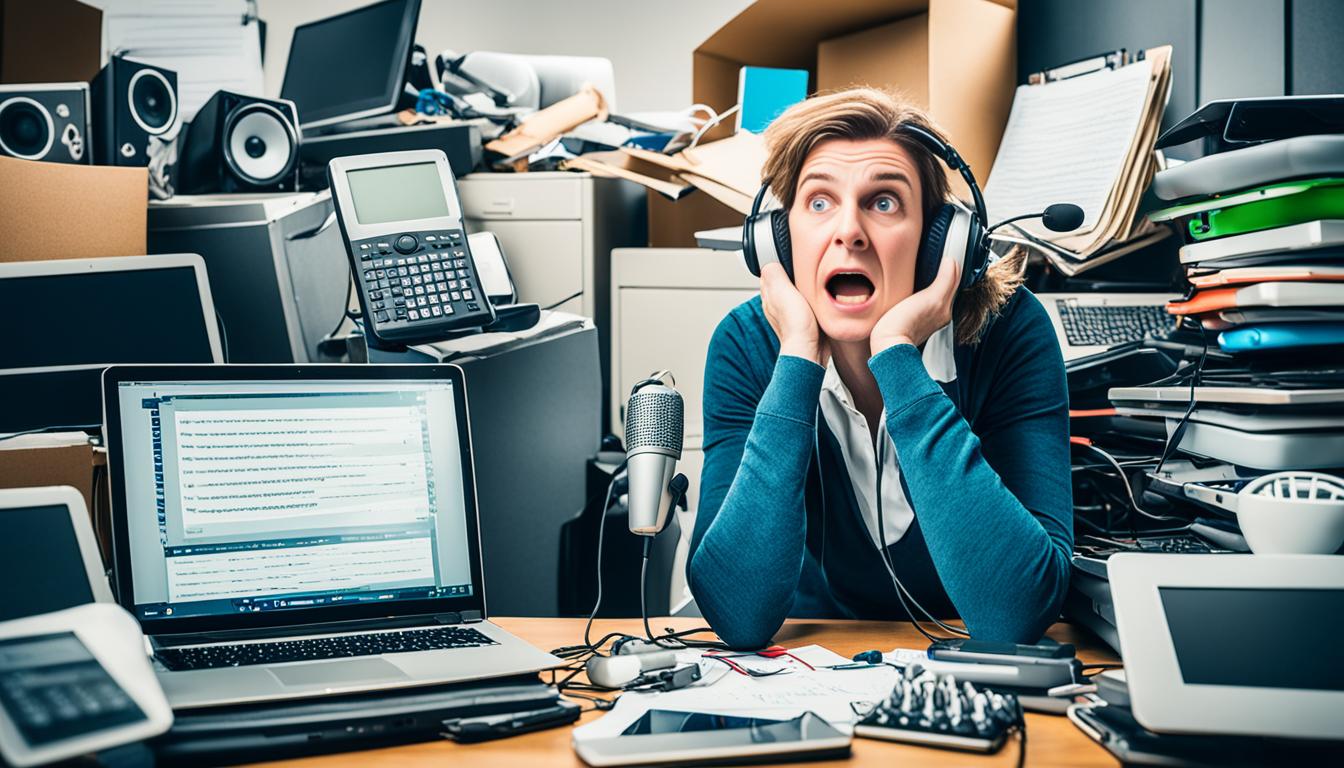Open-plan offices are now more common. They often have sound-reflective surfaces, such as glass and concrete. This means the considered noise pollution is a bigger issue at work. Surveys show that people are very concerned about sound pressure levels and the impact of unwanted sound. They even place it above how clean or comfortable an office is. With over 70% of offices being open-plan, noise is a significant problem for how effectively we perform our jobs.
Open offices can reduce productivity by as much as 66% due to noise. Conversational distractions can cause significant work stress. The European Union found that noise issues cost over $52 billion a year. Employees in such noisy offices also take 70% more sick days than those who work from home.

Julian Treasure asserts that sound waves profoundly impact our minds and bodies without our conscious awareness. Being around excessive environmental noise at work can increase stress levels. This is detrimental to human health, as it raises blood pressure and heart rate. Too much noise over time also messes with our stress hormones. This can lead to serious health issues like ischaemic heart disease and even permanent hearing loss.
The quality of sound in offices is super important. It’s not just about staying productive. It’s also about maintaining good health and well-being in the workplace.
Noise-Induced Stress from Environmental Noise
Noise-induced stress is a significant problem today, particularly in urban areas and at the workplace. It can cause health issues such as high blood pressure and difficulty thinking clearly. It can even lead to serious heart problems like heart attacks. It’s essential to understand how noise-induced stress affects us. This helps make our work lives better and makes employees more aware of the harmful effects.
Physiological Responses to Noise Exposure and Occupational Noise
When we are exposed to excessive noise, our bodies react by releasing stress hormones. Studies have shown that noise in the workplace can cause our hearts to beat faster and increase our blood pressure. This is particularly true for areas near airports, where aircraft noise is a significant concern. Excessive noise stress can lead to high blood pressure. It can also make it hard to sleep, causing sleep disturbance. Using devices that make white noise or headphones that provide hearing protection can help us feel better.

Long-term Health Effects of Noise Pollution on Environmental Health
Exposure to excessive air pollution and the considered noise pollution for an extended period can be detrimental to our health. It can lead to serious issues like heart disease and even affect how we think and feel. Traffic noise, for example, can make people more likely to feel depressed, affecting mental health. It can also cause problems with how well children learn and speak. Adults may become more anxious and struggle to cope with stress. Noise from trains at night might make it hard for us to stay alert during the day. Making our homes quieter, such as by using windows with better sound absorption, helps protect our health and improves our overall well-being.
Decreased Productivity
Noise at work can significantly impact our ability to think clearly and perform our jobs effectively. Even just hearing people talk can make it hard to understand speech, reducing productivity by up to 66%. If someone is talking nearby, it becomes even harder to keep our minds on work.
Impact on Focus
Research has found that random noises are more detrimental to our work than constant noise. A comprehensive review of 242 studies found that this type of noise significantly distracts us. It found that just 3 hours of typical office noise can make us stressed and less able to concentrate.
Testing in noisy places showed that it’s tougher to get work done right. People also didn’t make their workspaces as comfortable, which made working harder. Other sources of noise, such as HVAC systems or printers, also contribute to the overall noise level.
Reduced Efficiency
Noise has been shown to reduce our efficiency in various tests. For example, a study at the University of Nebraska found that increased noise led to poorer performance. People were slower at tasks that needed careful thinking if there was low-frequency noise, often produced by road traffic noise. Prolonged exposure can also lead to the development of tinnitus.
Certain background sounds might help with being creative, but not always with focusing. Using apps like Krisp can block out noise on calls, helping us concentrate better.
Understanding how noise impacts our work is crucial. Approximately 30 million workers in the U.S. are regularly exposed to loud noises from various sources, including construction sites and occupational noise. This can lead to more mistakes and even accidents at work.
Disruptive Conversations and Noise Levels in Open-Plan Offices
Open-plan offices are designed to encourage people to communicate more. But their chats often disturb others. When you can hear every word, it’s hard to focus in a noisy environment. This can affect your memory and cognitive abilities.
Too much talk makes it hard to work well. It can make you forget things. It also makes it hard to think deeply.

Impact of Speech Intelligibility
It’s hard to ignore what people say around you. Our brains pay more attention to words we can understand. This can make it hard to stay on task. Stories or news can divert your attention.
Deep work suffers because of this. You might make more mistakes. Your work could also slow down.
Concentration Interference
The “cocktail party effect” demonstrates that we tend to hear certain sounds first. Like your name in a noisy room. This makes office noises more annoying.
Alarms or overhearing talks can break your focus. Even usual office sounds tire the brain. Getting back to work can take a long while. This reduces your productivity every day.
Financial Costs
Noisy workplaces have a big financial impact on companies. They lead to higher healthcare costs and less productivity. Due to noise, companies experience increased absences and reduced productivity.
Healthcare Costs
Healthcare costs associated with workplace noise are substantial. In Australia, over 80,000 men and more than 31,000 women may experience hearing loss due to exposure to workplace noise. This could result in a loss of 62,218 Quality-Adjusted Life Years. And 135,561 Productivity Adjusted Life Years could be lost. The cost for this problem could be around AUD 5.5 billion.
Lost Productivity
Productivity loss due to workplace noise is a significant issue. Over 1.1 million workers in Australia are exposed to excessive noise. This results in numerous absences and reduced productivity. In noisy environments, work productivity can drop by as much as 60%.
Delays in decision-making also incur costs. Noise can impact the quality of decision-making. But algorithms help make better choices, avoiding some noise effects. In total, lost productivity due to noise is estimated to be around AUD 21.3 billion in Australia.
Challenges in Multitasking
Today, it’s challenging to multitask due to the numerous distractions at work. Only a few people can do it well. For most people, background noise makes focusing difficult. This affects how well we do our tasks.

Distractions can make it hard to pay attention. Stanford University found that answering an email can distract us for 30 minutes. This shows how open offices slow us down, increasing task time.
People who use many digital tools often struggle to ignore what’s not important. Their work slows down, and mistakes occur more frequently. These errors can make a workplace less efficient.
Trying to multitask can overwhelm our brains. College students who did this took longer to do their work and got lower grades. Media multitaskers also struggle to focus and remember. All this research indicates that multitasking, especially when accompanied by distractions, negatively impacts our work quality.
Effects on Physical Ergonomics
Regular office noise can harm workplace ergonomics. Research shows that constant background noise results in fewer employee movements. This leads to an increase in muscle and joint disorders, which are already common in offices.
Poor ergonomics can harm musculoskeletal health, exacerbated by ongoing noise exposure. Noise stress causes tension, leading to static positions that harm muscles and joints. This results in more back pain, neck pain, and carpal tunnel syndrome.
Bad design and noise lower productivity. It’s challenging for employees to focus, resulting in a difficult work environment. Companies with these issues often experience higher staff turnover due to low morale and dissatisfaction.
Better ergonomics can address these issues, enhancing health and productivity at work. Investments lower absenteeism by reducing health issues. They make the workplace better and more efficient. It’s essential for businesses to understand how office noise impacts ergonomics.
Impacts on Long-Term Mental Health and Lost Sleep from Noise Pollution
Loud noises hurt our health in big ways, affecting millions. Chronic noise raises the risk of heart disease. It’s why over 100 million Americans face such risks.
Hearing Loss
Exposure to loud noise over a long period can damage our hearing. This type of noise can cause permanent damage to the hearing. Around 10 million Americans can’t hear well because of noise or trauma.
Even everyday sounds, such as those from lawnmowers or subways, can be dangerous. They can be louder than 85 decibels and hurt our inner ears.
General Health Decline
Noise pollution doesn’t just affect hearing; it also impacts our overall well-being. It makes our overall health worse. People living near noisy areas, such as highways, tend to experience more health problems.
Too much noise increases our stress levels. This can cause our hearts and blood vessels to become sick. Noise louder than 53 dB from roads can harm our health, says the World Health Organization.
Productivity And Noise Control in Construction Sites and Offices
The hidden costs of noise in the workplace can have a significant impact on productivity. Noise impacts workers in unexpected ways. This leads to a decrease in productivity due to distractions and hinders cognitive performance.
Noise plays a crucial role in nature, particularly in ecosystems. The Great Barrier Reef is noisy when it’s healthy, which attracts a variety of fish. On the other hand, quiet reefs usually are dying. Just as fish react to noise for survival, people respond to sound levels in different ways. For example, whales show less stress when shipping noise is reduced. This is similar to how less noise in offices lowers stress for employees.

Using speakers to mimic healthy reef sounds helps damaged areas. In offices, sound strategies can reduce the bad effects of noise. Extreme reactions of beaked whales to sonar highlight serious issues. Unseen productivity losses from workplace noise can be severe.
Wildlife reacts to low-level noise as if it’s a threat. In offices, noise can lead to increased sensitivity and a fear of sound, which can negatively impact work and health. Even everyday sounds can distract and lessen how well we focus on tasks if they’re too constant.
Getting back on track can take more than 20 minutes after a distraction. Framery pods lower speech sounds by 30.3 dB, helping focus. Offering quiet spaces helps workers perform their best and stay productive.
Fatigue and Tiredness
Too much noise at work can make you feel very tired. The effort to ignore this noise can be exhausting. Arline Bronzaft’s work highlights the importance of quiet for our health at work.
Workplace noise can cause your body to release stress hormones, such as cortisol. This makes you feel more tired and less well overall. It can also make it hard to focus and pay attention to important tasks.
Being exposed to excessive noise for prolonged periods can harm your health. It can mess up your sleep, raise your blood pressure, and cause heart problems. Workers in construction, airports, and manufacturing often encounter loud noise on a daily basis. Office workers also experience noise issues, even if it’s just background sounds.
Creating quiet spaces at work can help people focus or relax more effectively. Wearing items like earplugs and earmuffs can also reduce noise. These steps protect your ears too.
Feeling tired all the time due to excessive stress or work can lead to burnout. This affects your memory, attention, and cognitive function, much like not getting enough sleep. You may feel extremely tired, become annoyed easily, and experience headaches and sore muscles. Your immune system might get weaker, and you might not feel like doing much. This can make you less productive.
To fight off tiredness and accomplish more, know your limits. Try to make your work area less distracting. Stay active to boost your energy. Learn how to nap well and take breaks to refresh your mind.
Increased Errors and Mistakes Due to Noise Levels and Background Noise
In a noisy environment, attention lapses are often seen. This leads to more errors and mistakes in work. Noise not only affects quality but also lowers productivity. This is a problem for 69% of workers worldwide.
Open-plan offices can make workers up to 66% less productive. This is due to noise distractions. High partitions can help make quieter spaces. This lets workers focus more.
Remote working offers a great solution. It lets workers find quiet spots, reducing mistakes. Organizations are also using soundproofing. This includes better insulation and double-glazed windows. It’s an effective way to cut noise and boost productivity.
Exposure to noise exceeding 85 decibels can cause health problems. These include high blood pressure and heart disease. Silence or ambient sounds help reduce this impact. It enables workers to stay productive without compromising their health.
Hazardous workplace incidents often come from human errors. These errors are linked to several factors. Poor design, distractions, and noise levels are a few reasons. Addressing these factors is key to safety and productivity.
Reduced Motivation and the Need to Reduce Noise Pollution
Noise at work can significantly reduce the amount of work employees want to accomplish. Too much noise leads to stress, causing stress hormones like epinephrine to increase. If nothing is done about it, people start doing less work.
Behavioral After Effects
Loud noises at work can make it difficult to focus and may even alter people’s behavior afterward. Studies show that noise disrupts the order in which we perform tasks. This can make employees less likely to tackle challenging tasks, which can hurt morale and productivity.
Stress Hormone Levels
Noisy workplaces can increase stress hormones. This affects how well employees handle tough tasks. When stress hormones are high, people tend to be less motivated and feel more helpless. This is not conducive to getting work done or maintaining a positive office vibe. Adjusting the volume of workspaces could make them more suitable for everyone.
Conclusion
Noise pollution at work is not just a small issue. It’s a big challenge to make work better, happier, and more efficient. The Finnish Institute of Occupational Health found that good sound design promotes the happiness and health of workers. This shows why it’s important to work on reducing noise.
In schools, noise can negatively impact students’ academic performance. Frontiers in Psychology addressed this issue. AAMC also shared how noise affects patients. This suggests that many areas require noise regulation. City planners utilize noise barriers and specialized pavements to reduce noise levels in cities. This proves that certain methods for reducing noise are effective.
Seventy-five % of office workers say noise makes it difficult for them to perform well. 40% struggle to focus when it’s noisy. The APA’s 2023 Work in America Survey found that noisy jobs can lead people to consider quitting. They feel stressed and less productive. But natural sounds can help lower stress and make people more focused and happy. Research backs this up.
Therefore, addressing noise pollution through targeted strategies is crucial. It leads to better work environments everywhere. From schools and hospitals to cities and offices, implementing these strategies can be highly beneficial. Investing in better sound environments is a big step. It improves work, happiness, and efficiency for everyone.
Frequently Asked Questions
How does workplace noise affect physiological stress responses?
Noise in open-plan offices can exacerbate stress responses. This includes higher blood pressure and heart rate. Everyday office sounds, like phones and talk, can up stress hormones. This may cause problems, such as high blood pressure.
What are the long-term health effects of noise exposure in the office?
Excessive exposure to office noise can damage hearing and cause muscle fatigue. It causes pain in the inner ear and results in reduced body movement. This can result in hearing loss and muscle issues.
How does background noise impact productivity in the workplace?
Background noise makes people less productive. It can be a significant distraction, reducing focus by up to 66% in tasks. A single talk nearby can greatly distract, lowering efficiency.
What role do disruptive conversations play in the workplace?
Loud talking in offices can significantly reduce work output. They make it hard to remember and focus on hard tasks. This badly hits productivity.
What are the financial implications of noise pollution in the workplace?
Noise at work is costly in terms of healthcare and lost days. The EU states that losses exceed 40 billion euros per year. Noisy offices result in up to 70% more sick days.
Why is multitasking more challenging in noisy environments?
Noise makes it hard for multitaskers to stay focused. Stanford research found they do worse in loud places. This shows less productivity in noise.
How does noise affect physical ergonomics in the workplace?
Office noise means less movement, upping the risks of muscle disorders. This was shown in The Journal of Applied Psychology. It leads to more muscle problems.
What long-term health issues are associated with office noise?
Over time, office noise can cause permanent hearing damage. It harms the inner ear. It also raises stress hormones, leading to problems like high blood pressure.
What is productivity noise, and why is it significant?
Productivity noise quietly lowers work efficiency and output. This type of noise can affect performance without our knowledge of its origin.
How does noise contribute to fatigue in the workplace?
Loud noise is a constant stressor, tiring out efforts to ignore it. This leaves people more tired after work. Arline Bronzaft shows that it increases exhaustion.
Does noise increase errors and mistakes in work tasks?
Yes, noise leads to more attention slips and errors. This lowers work quality and outcomes. The noisy atmosphere hurts productivity.
How does noise impact employee motivation and morale?
Constant noise can hurt motivation by increasing stress and reducing effort on challenging tasks. This lowers morale and productivity over time.

More Posts
Avoid these Common Mistakes for a Productive Monday Morning
 Monday mornings are often seen as tough. 80% say it's the week's most stressful day. This stress comes from too much work, too...
6 Must-Try iPad Digital Planners for Professionals
If you’re tired of traditional paper planners and looking to transition into digital planning, you’ve come to the right place. Whether you’re a business professional juggling complex projects or a creative person sketching...
7 Best Daily Habits for Success to adopt
In our bustling lives, we often overlook the quiet and unassuming power of best daily habits. Like cogs in a grand clockwork, they subtly keep the engine of our lives humming smoothly. We...
Top 5 Creative Project Management Software
Managing creative projects can be akin to navigating a labyrinth in today’s fast-paced digital realm. The challenges are manifold - from aligning multiple teams to ensuring timely delivery. This is where creative project...